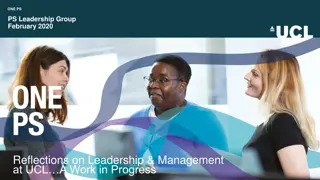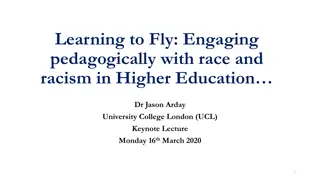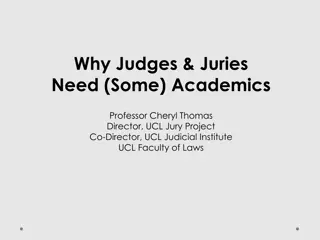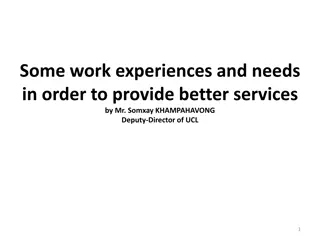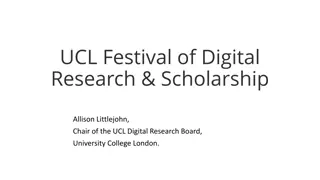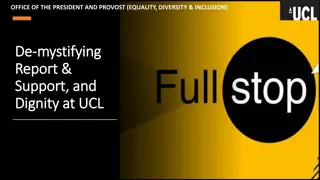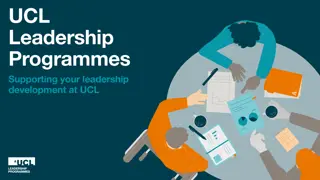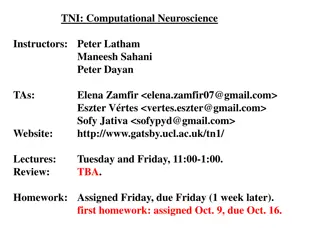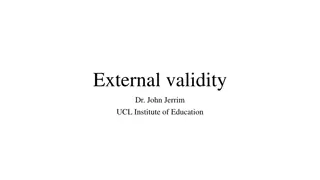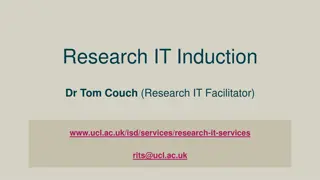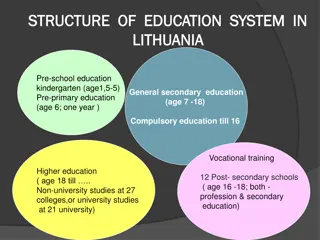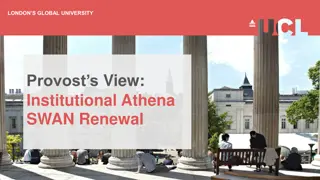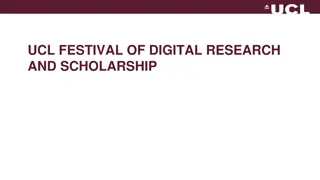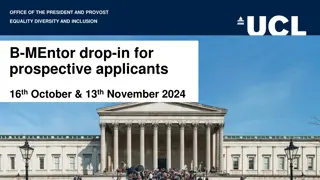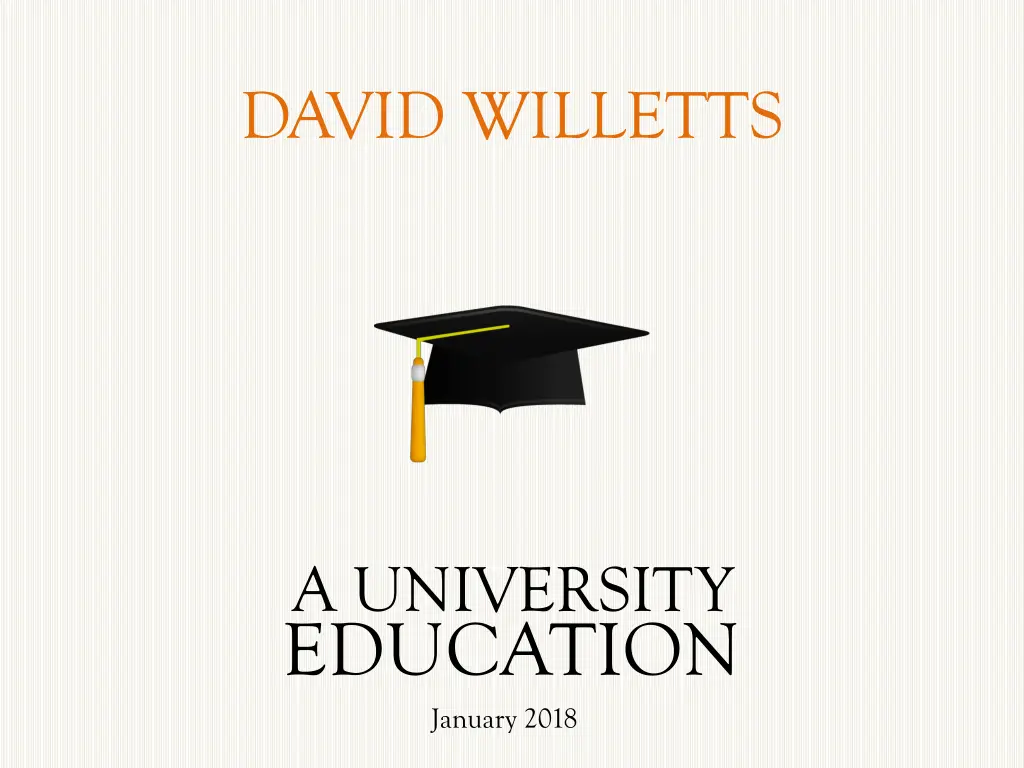
Exploring the Evolution of Universities Through History
Delve into the rich history of university education with insights on the significance of Oxford and Cambridge, the proliferation of universities in European countries, the call for more educational institutions, a discussion on excellence and producer power, government legislation impacting universities, and a reflection on the benefits of higher education. Discover the diverse perspectives and developments shaping the academic landscape.
Download Presentation

Please find below an Image/Link to download the presentation.
The content on the website is provided AS IS for your information and personal use only. It may not be sold, licensed, or shared on other websites without obtaining consent from the author. If you encounter any issues during the download, it is possible that the publisher has removed the file from their server.
You are allowed to download the files provided on this website for personal or commercial use, subject to the condition that they are used lawfully. All files are the property of their respective owners.
The content on the website is provided AS IS for your information and personal use only. It may not be sold, licensed, or shared on other websites without obtaining consent from the author.
E N D
Presentation Transcript
DAVID WILLETTS A UNIVERSITY EDUCATION January 2018
First there was Oxford and then Cambridge DAVID WILLETTS A UNIVERSITY EDUCATION
Number of universities in European Countries (1300-1790) 25 1300 1378 20 1500 15 1790 10 5 0 Italy France Spain Scotland England DAVID WILLETTS A UNIVERSITY EDUCATION
Why not have more universities? Why universities and colleges should only be at Oxford and Cambridge I know no reason. It would be more advantageous to the good of all the people, to have Universities or Colleges, one at least in every great town or city in the nation as in London, York, Bristow, Exceter, Norwich and the like; and for the State to allow to these Colledges an honest and competent maintenance for some godly and learned men to teach the Tongues and Arts, under a due reformation. William Dell, Puritan master of Caius College, Cambridge speaking to the Westminster Assembly of Divines. 1643 DAVID WILLETTS A UNIVERSITY EDUCATION
What is excellence and what is producer power? The privileges of graduates in arts, in law, physick and divinity, when they can be obtained only by residing a certain number of years in certain universities, necessarily force a certain number of students to such universities, independent of the merit or reputation of the teachers. Adam Smith DAVID WILLETTS A UNIVERSITY EDUCATION
Government Legislation on Universities: A case study 1854 The Oxford University Act 1856 The Cambridge University Act 1857 Oxford University Act 1857 Universities of Oxford and Cambridge Act 1859 Oxford University Act 1860 Oxford University Act 1862 Oxford University Vinerian Foundation Act 1865 Universities Tests Act 1871 1877 Universities of Oxford and Cambridge Act 1880 Universities of Oxford and Cambridge (Limited Tenures) Act DAVID WILLETTS A UNIVERSITY EDUCATION
Challenging the Edusceptics the benefits of higher education DAVID WILLETTS A UNIVERSITY EDUCATION
How to pay for it? DAVID WILLETTS A UNIVERSITY EDUCATION
Median Wages: post-graduates, graduates, and non-graduates 2016 Aged 16-64 Median salary Non-graduates 22,500 Graduates 32,000 Postgraduates 38,000 Aged 21-30 Median salary Non-graduates 19,000 Graduates 25,000 Postgraduates 29,000 DAVID WILLETTS A UNIVERSITY EDUCATION
Marx was right. If higher education institutions are also free , that only means in fact defraying the cost of education of the bourgeoisie from the general tax receipts. Karl Marx, Critique of the Gotha Programme 1875. DAVID WILLETTS A UNIVERSITY EDUCATION
So was Robbins "I have little doubt that, as time goes on and the advantages of higher education are more generally perceived, and the burdens of financing its expansion are more severely felt, there may easily come a change in attitudes such that the equitable arguments for a considerable replacement of grants by loans will become practically relevant." DAVID WILLETTS A UNIVERSITY EDUCATION
Four reasons for the current system The Principle it is progressive The Economics investing in human capital The Challenge tackled under-funding of higher education and cutting public spending The Opportunity End of number controls DAVID WILLETTS A UNIVERSITY EDUCATION
Why dont we have price competition? Income contingent repayment Competition for student numbers is a powerful incentive No good criterion for price differentiation DAVID WILLETTS A UNIVERSITY EDUCATION
Ranking universities (1 of 2) University of Oxford University of Leeds University of Cambridge University of Birmingham University of Durham University of Southampton University of St Andrews Cardiff University University of Bristol University of East Anglia University of Exeter University of Liverpool Imperial College University of Strathclyde University of Edinburgh Heriot-Watt University University of Warwick King's College London University of York Oxford Brookes University University of Sheffield University of Surrey DAVID WILLETTS A UNIVERSITY EDUCATION
Ranking universities (2 of 2) University of Dundee Edge Hill University Bournemouth University University of Salford University of Kent Brunel University London University of Portsmouth Teesside University Nottingham Trent University University of Huddersfield University of Hull University of Bedfordshire University of Brighton London South Bank University University of Worcester London Metropolitan University Queen Mary University of London University of East London University of Lincoln University of Wolverhampton University of Derby University of Bradford DAVID WILLETTS A UNIVERSITY EDUCATION
A clue to the rankings DAVID WILLETTS A UNIVERSITY EDUCATION
Percentage of first degree full time entrants from NS-SEC 4-7, 2014-15 (1 of 2) University of Oxford 10% University of Leeds 23% University of Cambridge 10% University of Birmingham 23% University of Durham 14% University of Southampton 23% University of St Andrews 14% Cardiff University 24% University of Bristol 15% University of East Anglia 25% University of Exeter 16% University of Liverpool 26% Imperial College of Science 16% University of Strathclyde 26% University of Edinburgh 19% Heriot-Watt University 26% University of Warwick 20% King's College London 26% University of York 20% Oxford Brookes University 28% University of Sheffield 21% University of Surrey 29% DAVID WILLETTS A UNIVERSITY EDUCATION
Percentage of first-degree full time entrants from NS-SEC 4-7, 2014-15 (2 of 2) University of Dundee Bournemouth University University of Kent University of Portsmouth Nottingham Trent University University of Hull University of Brighton University of Worcester 29% 31% 33% 33% 33% 33% 34% 37% Edge Hill University University of Salford Brunel University London Teesside University University of Huddersfield University of Bedfordshire London South Bank University London Metropolitan University 39% 42% 43% 46% 46% 50% 51% 51% Queen Mary University of London University of Lincoln University of Derby 37% 37% 39% University of East London University of Wolverhampton University of Bradford 55% 57% 58% DAVID WILLETTS A UNIVERSITY EDUCATION
Good universities should charge more. But what makes a university good ? Graduates earn more because of Social background of parents Prior attainment of students Geographical location Move up rankings also because of Research Excellence DAVID WILLETTS A UNIVERSITY EDUCATION
Students on high paying courses should pay more Law, Economics and Management Medicine and STEM Arts and Humanities DAVID WILLETTS A UNIVERSITY EDUCATION
Some bad ideas to change this system Differential fees on what basis? Cut fees and cut resource A graduate tax back to public spending Raise repayment threshold is this the problem? Reallocate the spending to non-HE DAVID WILLETTS A UNIVERSITY EDUCATION
Some better ideas to improve it A regular five year review Maintenance grant - more cash for students More funding for part time students A pupil premium for disadvantaged students More funding for high cost courses STEM The interest rate? DAVID WILLETTS A UNIVERSITY EDUCATION
Innovation: The British Problem many of our industries have since the outbreak of war suffered through our inability to produce at home certain articles and materials required in trade processes, the manufacture of which has become localised abroad, and particularly in Germany, because science there has been more thoroughly and effectively applied to the solution of scientific problems bearing on trade and industry A great part of all research will necessarily be done in Universities and Colleges which are already aided by the State Scheme for the organisation and development of scientific and industrial research Cd 8005, July 1915. Paragraphs 1 and 5 DAVID WILLETTS A UNIVERSITY EDUCATION
Dual funding Low trust transactional Research Council funding ( 2.7b) High trust patient substitute for endowment from HEFCE ( 1.6b) But a gap no high trust funding outside universities. DAVID WILLETTS A UNIVERSITY EDUCATION
Types of R&D as % of GDP United Kingdom France Germany United States Total Gross Expenditure on R&D (GERD) Business Sector R&D (BERD) Higher Education R&D (HERD) 1.7 2.26 2.84 2.74 1.1 1.46 1.93 1.94 0.44 0.46 0.49 0.39 Government R&D (GovERD) 0.13 0.3 0.42 0.31 DAVID WILLETTS A UNIVERSITY EDUCATION
HE R&D % of Gross R&D COUNTRY HERD%GERD China (People's Republic of) 6.9 Korea 9.1 Japan 12.6 United States 14.2 Germany 17.3 France 20.6 Finland 22.9 United Kingdom 26.1 Sweden 29.0 Norway 31.1 Denmark 33.2 DAVID WILLETTS A UNIVERSITY EDUCATION
The British Model High on autonomy Low on application Good for the university rankings Bad for Innovation DAVID WILLETTS A UNIVERSITY EDUCATION
Future Challenges Where: Brexit & Globalisation How: Technology What: The problems of specialisation DAVID WILLETTS A UNIVERSITY EDUCATION
Where: Brexit & Globalisation Student flows :post-study work and the MAC opportunity Taking fee loans abroad Staff flows Horizon 2020 and after A campus in the EU? DAVID WILLETTS A UNIVERSITY EDUCATION
Education Technology today DAVID WILLETTS A UNIVERSITY EDUCATION
Education Technology tomorrow Disintermediated or disintermediator? MOOCS v SPOCs. The 2U model for masters Data Analytics No back row DAVID WILLETTS A UNIVERSITY EDUCATION
What: A broader education Percentages of girls and boys with GCSE A* doing that subject at A Level DAVID WILLETTS A UNIVERSITY EDUCATION
DAVID WILLETTS A UNIVERSITY EDUCATION January 2018

